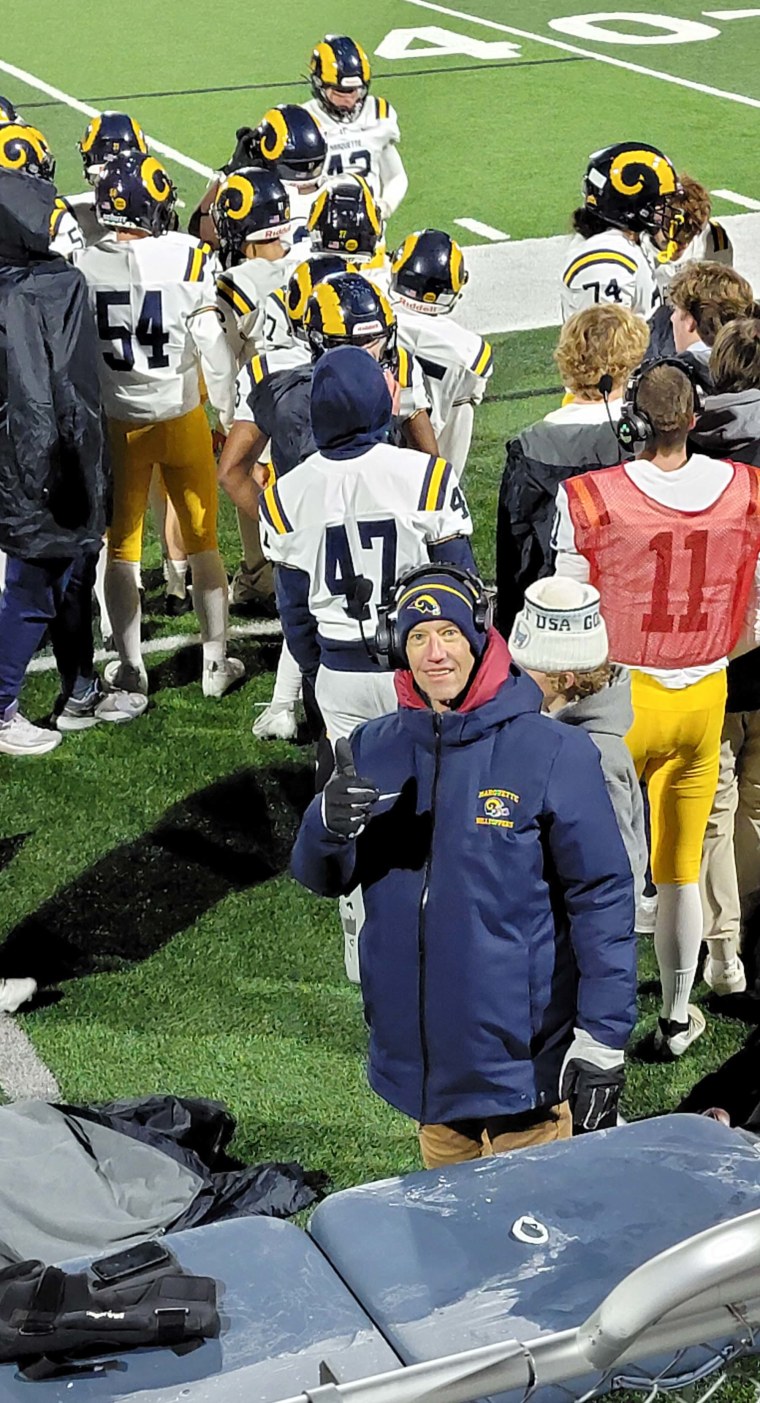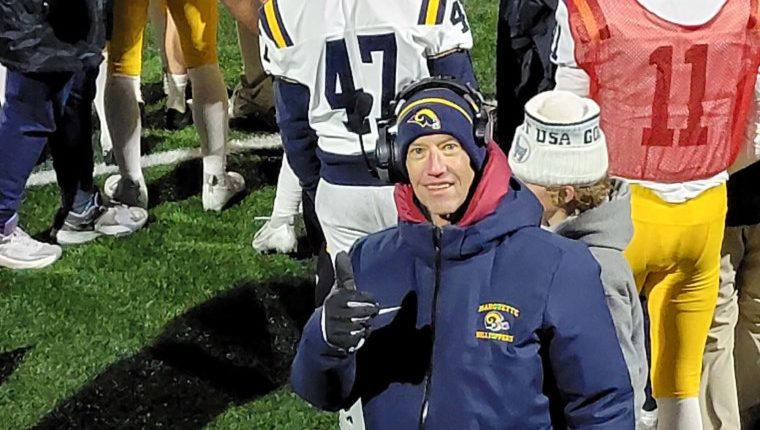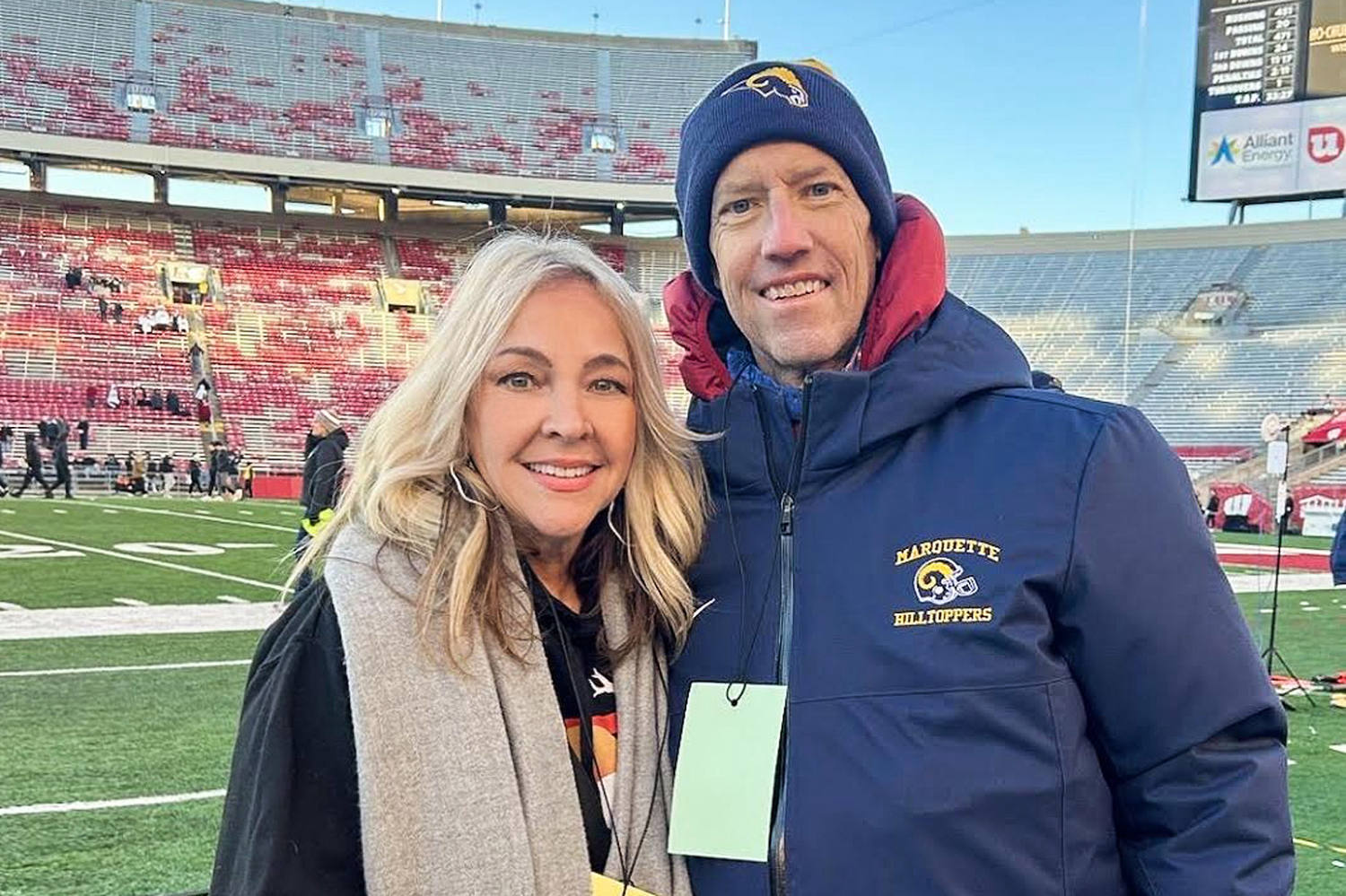Sometimes Connie Bolle wonders if her husband, Jeff Bolle, 60, would still be alive if things had been different last spring.
After being diagnosed with stage 4 cancer, the high school football coach and counselor started chemotherapy in 2023, but he had to stop abruptly when the drug he received, cisplatin, became harder to find as part of a nationwide shortage of chemotherapy drugs.
“I just keep wondering, ‘What if we had gotten the cisplatin? Could it have slowed his cancer down? she tells TODAY.com. “Would he have been able to coach even more? Would he have been stronger? Would he have felt better? … It’s always a second guess.”
While grappling with stage 4 cancer, Jeff Bolle continued coaching high school football for one last season. What a season it was as his team won the state championship.
In 2022, Jeff Bolle, of Milwaukee, learned he had bile duct cancer, which has a dismal long-term survival rate. At the time, doctors hoped that surgery and chemotherapy could prolong his life. He was in good health prior to his diagnosis, which made everyone feel optimistic.
He underwent surgery and four rounds of chemotherapy before the chemotherapy shortage stopped his treatment in May 2023 — two rounds short.
As the months passed and his cancer progressed unchecked, Jeff Bolle became sicker. In late September 2023, doctors realized “there was really nothing else they could do, which was hard to hear,” Connie Bolle recalls. There was no immunotherapy. There was no other chemotherapy.”
Jeff Bolle died on Dec. 29, 2023, seven months after losing access to his chemo drugs.
Last summer, Jeff Bolle shared his story with TODAY.com to raise awareness of the chemotherapy shortage. He also shared his desire to coach at least one more football season. He achieved that — and it was even sweeter than he could have imagined.
“The Marquette University High School ended up winning the division one state championship football title, and they were not predicted to be the one (to win),” Connie Bolle says. “Jeff made it to every single one of the games.”
Stage 4 cancer diagnosis
When Jeff Bolle felt the twinge of back pain in October 2022, he thought he pulled a muscle while exercising. But later that year, he was diagnosed with stage 4 bile duct cancer.
He underwent surgery, where doctors removed most of the tumor, and then started immunotherapy and chemotherapy, even though he knew he would likely never be cured.
“My doctor said it was the type of cancerous growth you’ll never really get into remission,” Jeff Bolle told TODAY in 2023. “Their thoughts were that they could get most of the tumor out and they could use chemo … to hold it off.”
The Bolles understood this. Still, it felt devastating when Jeff Bolle stopped treatment because of the chemotherapy shortage.
“He was never able to get on cisplatin (again),” Connie Bolle says. “His cancer was just continuing to grow, and his bile ducts were getting compromised because the cancer was pushing on them even more. He was really getting so very sick. It was horrible.”
A few times, Jeff Bolle couldn’t get imaging of his cancer because of shortages of agents used in such procedures.
Although he felt too weak to work as a counselor, Jeff Bolle continued coaching football. Prior to becoming sick, he’d ride to practice on his motorcycle, wearing sleeveless shirts to show off his biceps. He often hit the weight room with the players and challenge them to bench presses. Even when sick, Jeff Bolle continued to show up for his players at least several times a week and at games.
Eventually, he needed a wheelchair to attend the games and sat on the sidelines, but he coached the defensive backs for as long as he could. No matter what, he always rated the game film after. In fact, Connie Bolls recalls that during one stay in the intensive care unit, he brought his laptop to grade a football game.
Connie Bolle says she believes he lived to finish this season.
“He knew how important it was for these high school kids,” she says. “Some of the seniors had journeyed with Jeff for four years.”
The team kept winning, ending up at the state championship in November.
“I don’t know how Jeff did it because he could barely stand honestly. At that point, he was probably down to about 140 pounds,” Connie Bolle says. “The cold was just intense, and he went up and down the sideline with his walker.”

Chemotherapy shortage
Last year, cancer patients, like Jeff Bolle, and oncologists faced some grim news: Many chemotherapy drugs and agents used in oncological imaging had become increasingly difficult to find.
The most impactful shortages were of chemotherapeutic agents carboplatin and cisplatin, often used in cancers that can’t be cured, Dr. William Dahut, chief scientific officer of the American Cancer Society, told TODAY.com in 2023.
But shortages of cancer therapeutics are not new.
“What we’re experiencing right now is really the latest of multiple waves of shortages that have really gone back a decade,” Mark Fleury, Ph.D., who works in policy development and emerging science at the American Cancer Society Cancer Action Network, tells TODAY.com.
“We have many drugs that have never really left shortage and some that cycle in and cycle back out (of shortages).”
Last summer, NBC News reported that 14 drugs used in cancer treatment were hard to come by. In April 2024, the U.S. Food and Drug Administration website indicates that 15 oncology agents are currently in shortage.
Asked about the status of the chemo shortage, FDA spokesperson Chanapa Tantibanchachai shared an email statement with TODAY.com that says:
“The FDA recognizes the potential impact that lack of availability of certain products may have on health care providers and patients. While the agency does not manufacture drugs, and cannot require a pharmaceutical company to make a drug, make more of a drug, or mandate who a pharmaceutical company chooses to sell its product to (among lawful purchasers), the public should rest assured the FDA is working closely with numerous manufacturers and others in the supply chain to understand, mitigate and prevent or reduce the impact of intermittent or reduced availability of certain products.”
FDA Commissioner Dr. Robert Califf told NBC News in May 2023 that the main reason for the chemo shortage is there’s not enough profit in producing these drugs, many of which are generic and do not have a patent. “A number of firms are going either out of business, or they’re having quality problems because of difficulty investing in their technology,” Califf said.
About an hour before Jeff Bolle passed away from stage 4 bile duct cancer, his dog, Kenzie, jumped up on his bed to lie beside him.Courtesy Jeff and Connie Bolle
While carboplatin and cisplatin are “still listed in shortage,” Fleury says last year the FDA allowed imports of cisplatin that helped assuage that shortfall, and the drugs are now being produced more widely in the U.S.
“We’re not seeing the type of shortage that we did,” Fleury says. “We qualify it as in shortage, but … patients are getting their drugs.”
How chemo drug shortages affect cancer patients
Cancer patients felt the shortages. A survey by the American Cancer Society Cancer Action Network published in December found that 10% of all cancer patients were impacted, but the “shortages were not felt equally,” Fleury says.
For example, people on Medicaid experienced a tougher time, with 22% reporting a cancer drug shortfall affected their treatment. Some reported struggling to find pain medications or other therapies not directly used to treat their cancer but still important, he notes.
“Folks just had no idea whether they were going to get their next treatment or not, whether the dose was going to be cut in half,” Fleury says. “These are drugs … have really formed the backbone (of cancer care) and in some case have pretty high efficacy. And if they’re not available, you’re entering uncharted territory.”
While patients grappled with a high “mental toll,” they also faced “logistical tolls,” too, with some patients driving around to find treatment, he says.
“There are patients today who need help,” Fleury adds. “We need to figure out how to better manage the crisis that we’re in, but we also need to address some of the underlying causes, which keep us in this constant state of crisis.”
Lawmakers have taken some steps to address this issue. While many bills often provide short-term solutions, the Senate Finance Committee has been “doing a deeper dive” to address constant shortages, Fleury explains.
“The government has an important role to solve this,” Fleury says. “(But) that’s not to say that the private sector can’t.”
A lasting impact
By Dec. 14, 2023, Jeff Bolle was in hospice at home. Connie Bolle knew he was nearing the end on Dec. 28, when he agreed to stay in a hospital bed on the first floor because he was too weak to get to their bedroom on the second floor. He died the next day.
“He only spent one night in it,” she says. “That was the sign of defeat.”
At his funeral, his players shared what Jeff Bolle meant to them.
“They said such amazing things about the strength and determination and perseverance (they learned) from Jeff and kindness and love and compassion,” she says.
Connie Bolle believes that her husband would be humbled hearing about the impact he had on his students. She also believes he would be proud that his story raised awareness of the shortage of cancer therapeutics.
“He really cared about other people not getting these chemotherapy drugs,” she says. “He would still be sad today that people are still dealing with this.”
Source: | This article originally belongs to Nbcnews.com










